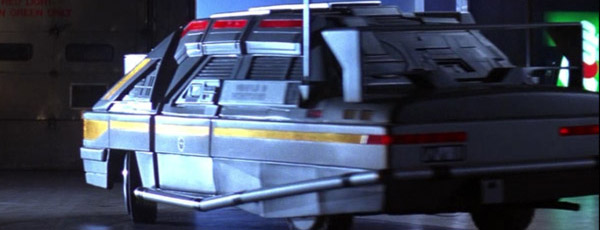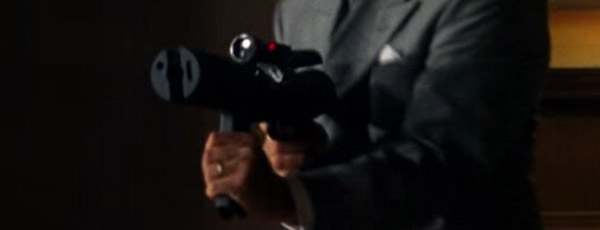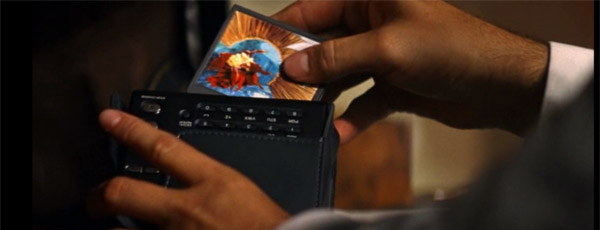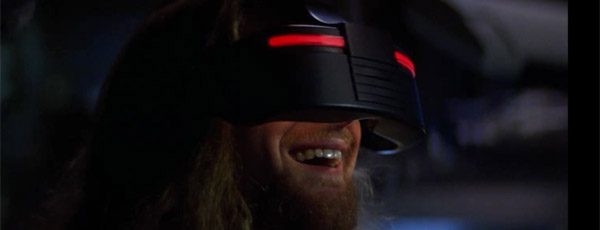A lot can happen in ten years, but perhaps not as much as you might expect. Filmmakers in the 80’s and 90’s predicted grand changes to society and technology as we prepared to enter the 21st century, but now that we’re here, how accurate were their visions?
Today, The Future Was Then looks at Timecop, the 1994 time-travel action flick starring Jean-Claude Van Damme. Interestingly, this week the Chinese government banned time-travel movies because they “disrespect history”, and after watching Timecop it’s kind of hard to argue with them.
Film: Timecop
Made In/Set In: 1994/2004
The Future 2004 Was: Time-traveling criminals, cars that drive themselves, and virtual reality sex simulators.
The Actual 2004 Was: The International Year of Rice. Also, SpaceShipOne wins the X-Prize, paving the way for consumer space travel, which is why here in 2011 we’re always going on trips into space all the time.
Plot Summary: It’s 1994, and there’s a meeting at The White House, where a guy tells some officials that time travel has been invented and that it’s already being used for nefarious purposes such as people robbing gold bars from the 1800’s and using them in the present to buy nuclear weapons, and that the government will need to set up a task force to police the time-stream against criminals. The politician’s only question after this huge flood of information: how much will the task force cost? He has absolutely NO FOLLOW-UP QUESTIONS ABOUT THE TIME TRAVEL STUFF. I can’t tell if that’s a commentary on politicians or just poor writing.
Anyway. Jean-Claude Van Damme is hired to be a Timecop and immediately his wife is killed in an explosion. Ten years later he does the thing where he mopes around watching old home movies of her to remind the audience that he is super sad. He travels into the past to stop his former partner from making money by gaming the stock market. His former partner is sentenced to be executed, and they send him back to 1929 and let him fall to his death on a busy street (huh?). Then JCVD travels back to 1994 to stop evil senator Ron Silver from making money to fund his presidential bid, but fails and has to team up with his past self to kick people in the face and do splits for no other reason than that he can do them. He saves his wife from being exploded and throws 1994 Ron Silver into 2004 Ron Silver, which you can’t do because the same matter can’t occupy the same space at the same time, or as JCVD puts it, “Zame madda cand occoopy zame zspace.” Ron Silver melts into an unconvincing blob and JCVD goes back to 2004 where his wife is still alive and they have a dorky kid.
How well did Timecop predict 2004?
Time Travel: Yeah, we’re still working on that. In the film, time travelers get into a rocket sled and shoot towards a wall at incredible speeds, and when they arrive in the past the sled is gone and they walk slowly and calmly out of a CG ripple. To return, they just push a button on a box and they reappear in the sled. I don’t get how that works at all.
Auto-driving Cars: In Timecop, JCVD gets into his ass-ugly car, which asks him where he wants to go. He says “Home”, and the car drives him home.
That seems pretty far-fetched, but in reality, 2004 was landmark year for auto-driving cars. In the first ever DARPA Grand Challenge, held in the Mojave desert in 2004, fifteen driver-less vehicles competed to see which could complete the 150 mile race with the best time.
It did not go well. Two of the fifteen cars were pulled from the race before it began, another flipped over on the starting line, and the rest suffered mechanical failures or got stuck on rocks or hills. The furthest a car got was about seven miles.
Weird Guns: I don’t know what the deal is with the 2004 guns in Timecop, it’s not explained. But they look a little different and instead of going BANG they go PEW. So. You know. THE FUTURE.
Audio Cartridges: Remember when we used to listen to music on plastic cassettes? And then we switched over to CDs? In the movie, we’ve switched back over to plastic cassettes again. They do look a little like Gameboy cartridges, though since Gameboy came out it 1989, Timecop didn’t so much predict the future as the past.
Voice-Activated Televisions: If you want to make your film futuristic, make it so appliances can be activated by saying their names. “Door,” “television”, “lights”, and so on. The only appliance I talk to is my laptop, when it routinely drops its wireless connection, but I don’t say “Computer”, I say, “Come on, you piece of shit.”
Virtual Reality Sex Visors: Ah, remember in the past when we thought the future would be giant visors we wore to accomplish tasks like opening computer files and masturbating? Those were the days. In the film, a technician enjoys some VR sex while at work, but in reality, while head-mounted display devices still have military, engineering, and medical applications, they’ve never really caught on with consumers, who still prefer to view pornography without ten pounds of plastic and circuitry sitting on their faces.





You’ll be ecstatic to know that the people behind Time Cop really wanted to make a television series follow-up to the movie and still really want to do that. Hey, I’d watch it. I would like to suggest “Alphaville” as the next The Future Was Then feature.